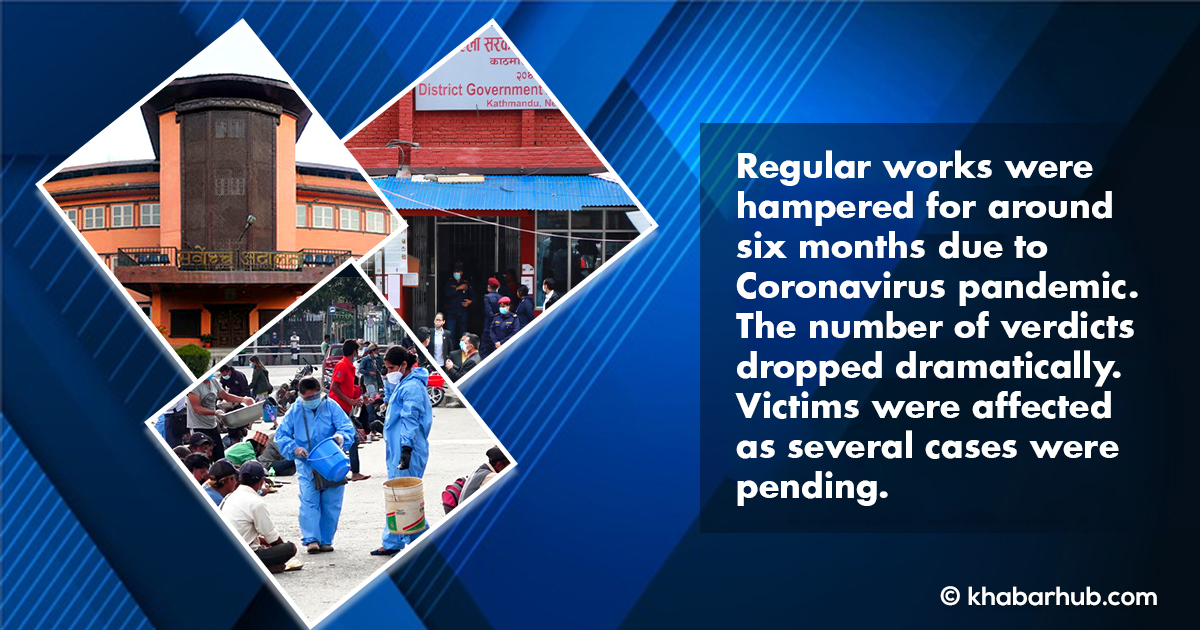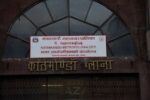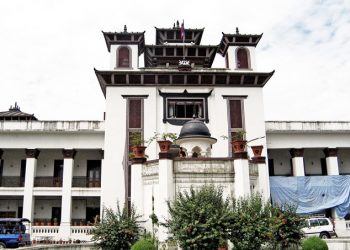KATHMANDU: The coronavirus pandemic affected not only the country’s health system but also the people’s daily life.
After the detection of the coronavirus infection in the country, the government of Nepal imposed a lockdown in the last week of March impacting all sectors including the government machinery.
The service of the agencies working on the frontline was adversely affected. Among them was the court as the proceedings were hampered.
According to the Supreme Court, the works of all the courts were affected for around six months. The Supreme Court, which used to deal with as many as 1,800 cases a month, had to shrink its services in the six months of the pandemic.
The spokesperson at the Supreme Court (SC), Bhadrakali Pokhrel said that the work could not be carried out regularly for around six months due to the coronavirus pandemic.
Due to the fear of the spread of coronavirus, the participation of people in court hearings has also decreased significantly.
The number of verdicts dropped dramatically. Victims were affected as their cases were pending. He said, “Even now since traveling has become a major problem, the general public has been facing difficulty in coming to the courts.”
Spokesperson Pokharel said there have been no arrangements to check symptoms of coronavirus of people entering the court premises.
Due to the fear of the spread of coronavirus, the participation of people in court hearings has also decreased significantly.
According to him, several cases were pending in the Supreme Court because of the crisis.
He said, “Some cases were filed amid the pandemic. The process of registering cases in other courts has been very sluggish. Integrity is affected. The cases and hearings had to be postponed.”
The number of cases registered in all courts, including the SC, has decreased due to the fear of coronavirus.
Spokesperson Pokharel said that the citizens were deprived of the opportunity to get services and access to justice even after the cases were registered.
Although the Supreme Court has minimized its services, it has carried out the important tasks to hold government bodies accountable and reduce the impact of coronavirus, according to Spokesperson Sharma.
He said, “The SC has been working to ensure that all responsible bodies and officials worked effectively in judicial decisions simultaneously managing the influence of COVID-19.”
According to him, they have been working as per their jurisdiction in sectors such as health, employment, relief distribution and rescue of Nepali citizens living abroad.
He said, “The SC has been working to make the citizens affected by the coronavirus responsible towards the state in such an adverse situation.”
Former Supreme Court Justice Balaram KC says the corona infection has exacerbated the problem at a time when the Supreme Court’s objective of providing access to justice has not been effective.
“The purpose of the court is to provide access to justice,” he said. Even under normal circumstances, the work has not been effective as per the objectives of the court. The impact of coronavirus has been felt in the courts as well, he said.
Although the court’s work has been affected by COVID-19, former Judge KC said, “Coronavirus is beyond anyone’s, including the court’s control,” he said. What needs to be understood is that judges and legal practitioners also love their lives.
In order to provide access to justice for all, the courts in Nepal have a system of paid legal practitioners for the helpless and the poor. However, according to KC, paid legal practitioners alone would not suffice to meet the demands.
The coronavirus also affected the registration and adjudication of cases in the Kathmandu District Court, which is the only court in the country to hear cybercrimes.
He said, “The paid lawyers in the court alone are not enough. The state should also provide counseling to victims of rape and domestic violence. Not all courts have enough paid legal practitioners.”
KC says the courts also have been adversely affected by the coronavirus. “This is the reality,” he added.
The Supreme Court remained open for filing writ petitions related to habeas corpus and COVID-19 emergency-related services even during the lockdown.
The Supreme Court stated that 42 writs related to coronavirus and habeas corpus were filed during the lockdown period. Among them, the SC issued 23 interim orders.
Meanwhile, a total of 2,314 cases have been decided by the high court, district court and tribunals.
According to SC, the courts gave the verdict to 586 civil cases, 1,629 criminal cases and 99 writ petitions. During the lockdown, 333 cases were settled and 135 cases were withdrawn. The Supreme Court said that the case details of the lockdown period are as follows:
69 habeas corpus applications in the High Court and seven in the District Court were registered.
Similarly, 14 writ petitions related to COVID-19 were registered in the High Court.
During the trial, 534 petitions were filed in the High and District Courts to hand over the custody of the children in the correctional facility considering the impact of COVID-19.
According to Article 155 of the Code of Criminal Procedure, a total of 639 petitions have been filed in the high and district courts for the implementation of the provision of cash payment for imprisonment for one year.
A total of 4,690 indictments have been filed in the high courts, district courts, special courts and tribunals and detention orders have been issued against 6,956 accused.
High and district courts have approved 1,951 arrest warrants and 2115 urgent arrest warrants.
High Court, District Court, Special Court and Tribunals have ordered 7 thousand 329 extensions.
No case during the lockdown
The coronavirus also affected the registration and adjudication of cases in the Kathmandu District Court, which is the only court in the country to hear cybercrimes, the court said.
The Constitution of Nepal has also given the responsibility of judicial adjudication on certain issues to the Chief District Officer and Deputy Chiefs at the local level.
According to Gyan Bahadur Karki, information officer of the court, no case was registered in the Kathmandu District Court during the lockdown and a restraining order.
On average, more than 100 cases are heard daily in the Kathmandu District Court.
Information Officer Karki said, “No case was registered during the lockdown period.”
After the lockdown, legal aid was provided to the helpless and poor in more than 50 cases through paid legal practitioners, Karki said.
Regarding the services provided by the paid legal practitioners, he said, “We have made arrangements to hold debates through the paid legal practitioners.”
Chiranjibi Koirala, a salaried lawyer at the Kathmandu District Court, said that the number of service recipients has decreased due to coronavirus.
He said that general issues could not be heard continuously. He said, “The job of paid legal practitioners is to help the genuine helpless. The record of the work done by the salaried lawyer should be sent to the Supreme Court in a report.”
The Constitution of Nepal has also given the responsibility of judicial adjudication on certain issues to the Chief District Officer and Deputy Chiefs at the local level.
In cases where the sentence is less than one year, only the Chief District Officers can decide. At the local level, there is a three-member judicial committee under the coordination of the deputy chief.
Even in such judicial committees, complaints were reduced during the lockout. Despite the increase in incidents during the lockdown, the victims could not go to seek justice. Many judicial committees have tried to get justice by making arrangements to file complaints on the phone.
Active social sector
After the onset of coronavirus, it has affected all areas. The people under the poverty line are the worst-affected. Although the services provided by the state bodies decreased, there was a lot of activism in the social sector.
Some landlords even evicted low-income individuals and families. In such a situation, ‘Hamro Team Nepal’ of 10 people started feeding food in Anamnagar on March 30.
The economic downturn during the lockdown has put those in trouble struggling to make their ends meet. Kathmandu, the capital city, is home to a significant number of people from all over the country. The lockdown and restrictive measures affected the largest population in the Kathmandu Valley.
Social organizations also provided food and other assistance to people in need. One of such organizations is the Hundred Group. The ‘Hundred Group’, which is running a campaign of free clothing bank, also started providing free food to the poor and needy.
Another such organization providing free food along with Hundred Group was ‘Our Team Nepal’. A significant number of people lost their jobs because of the lockdown.
Some landlords even evicted low-income individuals and families. In such a situation, ‘Hamro Team Nepal’ of 10 people started feeding food in Anamnagar on March 30.
Laxman Singh Dhami Kunwar, Secretary of Our Team Nepal, said that the group started feeding the people by collecting Rs. 25,000 per person from the group with the holy aim of preventing any Nepali from going hungry. He said his group also operated a pharmacy.
“It was helpful to see those who didn’t get food,” Kunwar said. After seeing the infection of coronavirus, the government started feeding those in trouble.
According to him, up to 400 people were fed daily in the first phase of the feeding campaign started by ‘Our Team Nepal’ during the lockdown.
“Initially, we fed 400 people every day. In between, we even arranged up to 700 meals a day for a few days. About 400 people ate daily,” Kunwar said.
According to him, they also arranged transportation for those who wanted to go home.
With the easing of the deadlock, the services of the state bodies also started increasing. Social organizations and campaigners are still active.









Comment